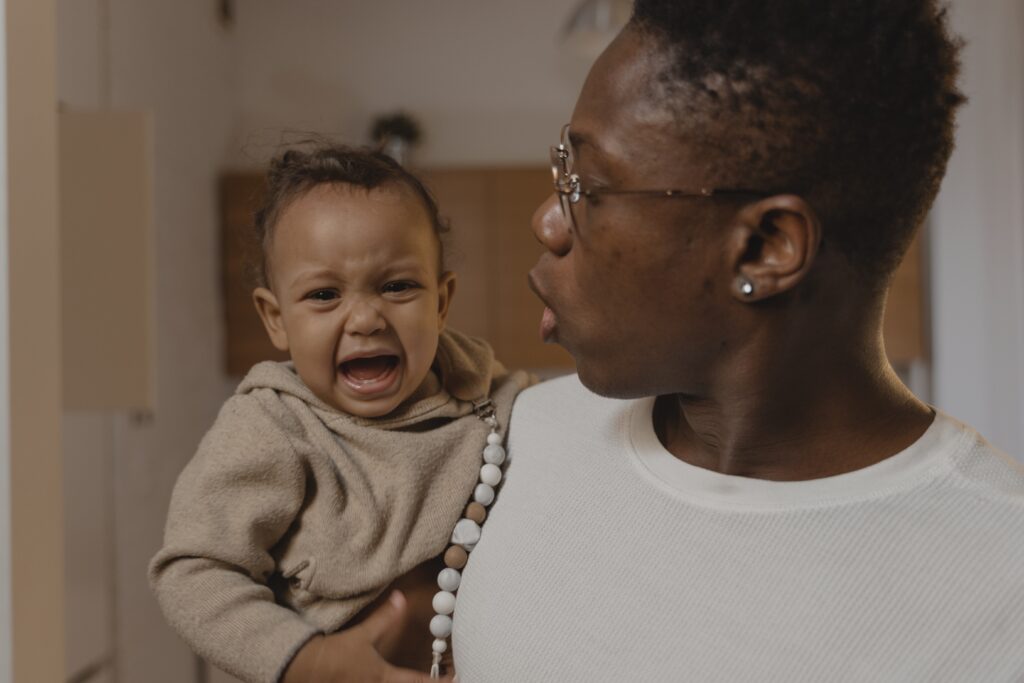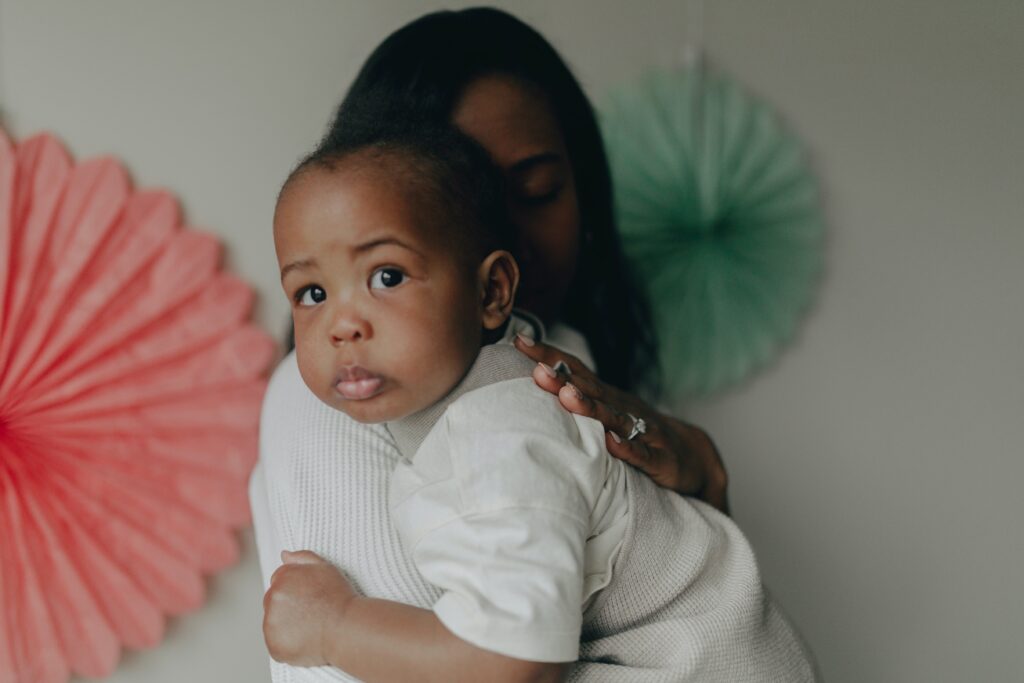If your baby is younger than 3 months and cries uncontrollably for more than 3 hours in a day for more than 3 days in a week and over 3 weeks or more, he may have colic! Here’s what you need to know.

What is Colic?
Colic means sudden and excessive crying for no particular reason. Crying is normal in babies, as that is how they express discomfort and attract their parent’s attention. But if your baby cries for hours without any reason, he may have colic. It usually appears 2 to 3 weeks after their birth and disappears at about 4 to 6 months of age. Though it is disheartening to watch, colic is not serious and will gradually subside.
If you are a new parent, you should know that colic is quite common as it is present in up to 20% of babies. Colic can be seen in breastfed and bottle-fed babies, term and pre-term babies, as well as, boys and girls.
What Causes Colic in Infants?
There is no specific reason for colic in babies, but there may be certain triggers that can cause discomfort, such as:
- Gastroesophageal reflux
- Immature digestive system
- Food intolerance or allergies
- Ingesting gas while feeding
- Mother’s diet and lifestyle during pregnancy and breastfeeding
- Imbalance of healthy gut bacteria
Signs of Colic in Babies
- Difference in Cry
A colicky baby will give out high-pitched loud wails.
- Cries at a particular time
Colicky babies may have crying bouts around the same time, every day.
- Posture
Colicky babies generally arch their back, clench their fists, and curl their legs while crying.
- Physical signs
A flushed face, frequent burping, and a tighter tummy are signs of colic.
Medical Treatment for Colic in Babies
- Probiotics
Probiotics have good bacteria that keep your baby’s intestines healthy. Your baby’s paediatrician may recommend this.
- Medication
Your doctor may prescribe medicine to relieve gas and ease colic.
- Change in Formula Milk
If colic is a result of lactose intolerance or allergies, the doctor may prescribe a non-milk based formula for your baby.
Home Remedies for Colic in Babies
- Warm Bath
A warm water bath relaxes the body and helps babies sleep better. Bathe your baby in warm water every night. Gently stroke his tummy while bathing to relieve gas.
- Burp your Baby
Babies inhale air while feeding, which get trapped and causes abdominal pain. To avoid this, place your baby in an upright position and burp him after every feed.

- Knee exercise
Knee bending relieves gas problems and colic. Lay your baby down on his back and bend his knees, pushing them towards the tummy. Repeat this four to five times.
How to Soothe a Colicky Baby
- Sing and Talk
Babies find their parent’s voice soothing and it helps them cope with the pain.
- Rocking
Find out which position gives maximum comfort to your baby, and rock him.

- Distract
Take your baby out on a car ride or stroller to distract him from the discomfort.
- Hold your baby in an upright position
This helps the digestion process and prevents reflux.
When Should You Consult a Doctor?
Consult your doctor if your baby:
- Develops diarrhea or there are traces of blood in the stools
- Has a fever ranging from 37.7 degrees Celsius or more
- Is not feeding or gaining weight properly
- Vomits often
- Is sleepy or groggy most of the time
A word from HealthFacts to you
Handling colicky babies can be difficult, but be patient and soothe your baby. Colic will gradually fade as your baby grows older, so don’t stress. Above all, never shake your baby.
Suggested Reading: Shaken Baby Syndrome: What You Need To Know










Los abogados fintech y los asesores financieros de RUE (Regulated United Europe) han creado un blog en el que publican los ultimos cambios en la legislacion de los paises europeos en el ambito de la criptomoneda y el VASP (Virtual Asset Service Provider) para la comodidad e informacion de todos los interesados en la legislacion de la criptomoneda en Europa. Basamos nuestros articulos en temas que son importantes para los empresarios de hoy en dia que trabajan en el campo de la criptomoneda, proyectos fintech, blockchain y negocios relacionados con las TI. Si no encuentra la informacion que le interesa en nuestro blog, por favor, pongase en contacto con nosotros de la manera mas conveniente para usted.
Regulated United Europe ist standig bestrebt, seine Leistungen und das Niveau der erbrachten Dienstleistungen zu verbessern, basierend auf dem standigen Feedback der Kunden und der Erfassung der Marktbedurfnisse fur juristische Dienstleistungen in verschiedenen europaischen Landern. Die Reaktionszeit auf Kundenanfragen/E-Mails wird ebenfalls auf ein Minimum reduziert.
Im Bereich der Preisgestaltung versucht Regulated United Europe ebenfalls, sich an die Bedurfnisse der Kunden anzupassen, indem es fur die meisten der erbrachten Rechtsdienstleistungen einen Festpreis anbietet, obwohl in den meisten europaischen Landern hauptsachlich Stundenhonorare zur Anwendung kommen.
Wir bieten unseren Kunden Rechtsberatung und tagliche Unterstutzung in jeder Phase der Projektumsetzung. Komplexe Losungen werden von einem Team erfahrener Juristen individuell fur jeden Kunden entwickelt.
Hi there! This is my first visit to your blog! We are a collection of
volunteers and starting a new initiative in a community in the
same niche. Your blog provided us valuable information to work
on. You have done a extraordinary job!
This technology could be especially beneficial for companies that need to evolve quickly on mold designs without compromising on quality.
Being able to include complex features into a
single tool could optimize the manufacturing process greatly,
lowering the need for multiple components.
It would be great to see more case studies on how this affects different manufacturing sectors.
That is a very good tip especially to those fresh to the blogosphere.
Brief but very precise info… Thanks for sharing this one.
A must read post!
Every weekend i used to pay a visit this site, as i want enjoyment,
since this this site conations really nice funny data too.
Good post. I certainly love this site. Stick with it!
Good article. I definitely appreciate this site.
Keep it up!
certainly like your web-site however you have to take a
look at the spelling on quite a few of your posts.
A number of them are rife with spelling issues and I find it
very bothersome to inform the reality on the other hand I’ll definitely come again again.
Excellent blog here! Also your web site loads up very
fast! What web host are you using? Can I get your affiliate link
to your host? I wish my website loaded up as quickly as yours lol
This page certainly has all the information I needed about this subject and didn’t know who to ask.
Great website. Plenty of helpful info here. I’m sending it to a few pals ans
additionally sharing in delicious. And of course, thank
you on your effort!
Hi, just wanted to tell you, I loved this post. It was practical.
Keep on posting!
My brother recommended I might like this web site. He was totally right.
This post truly made my day. You can not imagine simply how much time I had spent for this
information! Thanks!
What’s up, after reading this amazing post i am as well delighted to share my know-how
here with mates.
I visit each day a few sites and blogs to read articles or reviews, but this
blog presents feature based content.
You really make it seem so easy with your presentation but I find this matter to be actually something that
I think I would never understand. It seems too complex and
extremely broad for me. I’m looking forward for your next post, I will try to
get the hang of it!
Please let me know if you’re looking for a article author
for your weblog. You have some really good articles and I think I would be
a good asset. If you ever want to take some of the load off, I’d really like to write some content for your blog in exchange for a link back to mine.
Please shoot me an email if interested. Cheers!
Hi there! Do you know if they make any plugins to
assist with Search Engine Optimization? I’m trying to
get my blog to rank for some targeted keywords but I’m not seeing
very good results. If you know of any please share.
Appreciate it!
This design is spectacular! You definitely know how to keep a reader entertained.
Between your wit and your videos, I was almost moved to start my own blog (well, almost…HaHa!) Wonderful job.
I really loved what you had to say, and more than that, how
you presented it. Too cool!
Why users still use to read news papers when in this technological world everything
is accessible on web?
I am regular reader, how are you everybody?
This piece of writing posted at this web site is in fact nice.
Hi there to every one, since I am truly eager of reading this blog’s post to be updated daily.
It includes pleasant material.
Truly no matter if someone doesn’t know afterward
its up to other users that they will assist, so here it occurs.
Asking questions are really pleasant thing if you are not understanding anything fully, however this paragraph presents pleasant understanding even.
This is a topic that is near to my heart…
Take care! Where are your contact details though?
I like reading a post that can make men and women think.
Also, thank you for allowing for me to comment!
I’m curious to find out what blog system you have been utilizing?
I’m having some small security problems with my latest website and I’d like to find something more risk-free.
Do you have any solutions?
Hi! I know this is kinda off topic but I’d figured I’d
ask. Would you be interested in trading links or maybe
guest authoring a blog article or vice-versa?
My website goes over a lot of the same topics as yours and I think we
could greatly benefit from each other. If you happen to be interested feel free to
send me an email. I look forward to hearing from
you! Wonderful blog by the way!
Great blog you have here but I was wondering if you knew of any community
forums that cover the same topics talked about here? I’d really love to be a part of online community where I can get feed-back from other experienced individuals that
share the same interest. If you have any recommendations, please let me
know. Thank you!
Hello there! I know this is kind of off topic but I was wondering which blog platform
are you using for this site? I’m getting fed up of WordPress because I’ve had issues with hackers and I’m
looking at alternatives for another platform. I would be awesome if you could point me in the direction of a good platform.
Hey! Do you know if they make any plugins to safeguard
against hackers? I’m kinda paranoid about losing everything I’ve worked hard on. Any recommendations?
Thank you, I’ve recently been looking for info approximately this subject for
ages and yours is the best I have found out till now.
But, what in regards to the bottom line? Are you sure concerning the source?
At this moment I am going to do my breakfast, after having my breakfast
coming again to read other news.
I think the admin of this web site is really working hard
in support of his web page, as here every information is quality based stuff.
Great weblog here! Additionally your website quite
a bit up fast! What web host are you using?
Can I get your affiliate hyperlink for your host?
I desire my website loaded up as quickly as yours lol
Now I am going away to do my breakfast, later than having my breakfast
coming yet again to read more news.
What i do not understood is in truth how you are not actually a lot more well-appreciated
than you may be now. You are so intelligent.
You recognize thus considerably with regards to this subject,
made me individually consider it from a lot of various angles.
Its like men and women are not involved unless it’s something to do with Lady gaga!
Your individual stuffs nice. At all times maintain it up!
Please let me know if you’re looking for a writer for your site.
You have some really great posts and I think I would be a good asset.
If you ever want to take some of the load off, I’d absolutely love to
write some articles for your blog in exchange for a link back to
mine. Please send me an e-mail if interested. Regards!
If you desire to get a great deal from this piece of writing then you have to apply
such strategies to your won blog.
Have you ever considered about including a little bit more than just your articles?
I mean, what you say is important and all. However imagine if you added some great pictures or videos to give
your posts more, “pop”! Your content is excellent but with images and clips, this site could certainly be one of the
greatest in its niche. Great blog!
hey there and thank you for your information – I’ve certainly picked up anything new
from right here. I did however expertise a few technical issues using this site, as
I experienced to reload the website many times previous to
I could get it to load correctly. I had been wondering
if your hosting is OK? Not that I’m complaining, but sluggish loading instances times will often affect
your placement in google and can damage your high quality score if advertising and marketing
with Adwords. Anyway I am adding this RSS to my email and can look out for much more of your respective fascinating content.
Make sure you update this again very soon.
I have been exploring for a little bit for any
high-quality articles or blog posts on this sort of area
. Exploring in Yahoo I at last stumbled upon this website.
Studying this information So i am satisfied to convey that
I’ve a very excellent uncanny feeling I found out just
what I needed. I most indubitably will make sure to do not omit
this website and provides it a look regularly.
Yesterday, while I was at work, my cousin stole my
iPad and tested to see if it can survive a 40 foot drop, just so she can be
a youtube sensation. My iPad is now broken and she has 83 views.
I know this is completely off topic but I had to share it with someone!
I loved as much as you will receive carried out right here.
The sketch is attractive, your authored material stylish.
nonetheless, you command get bought an shakiness
over that you wish be delivering the following. unwell
unquestionably come more formerly again as exactly the same nearly
a lot often inside case you shield this hike.
I have to thank you for the efforts you have put in writing this
site. I am hoping to check out the same high-grade content from you later on as well.
In truth, your creative writing abilities has encouraged me to get my own,
personal blog now 😉
Very good post. I’m going through many of these issues as well..
I am really impressed with your writing
skills as well as with the layout on your weblog.
Is this a paid theme or did you customize it yourself?
Either way keep up the nice quality writing, it is rare to see a nice blog like this one today.
I am really enjoying the theme/design of your site.
Do you ever run into any browser compatibility issues?
A number of my blog readers have complained about my site not operating correctly in Explorer but looks great in Chrome.
Do you have any advice to help fix this problem?
It’s very effortless to find out any topic on web as compared to textbooks, as I found this post at
this web site.
you are actually a just right webmaster. The site loading pace is amazing.
It seems that you are doing any distinctive trick. Moreover, The contents are masterpiece.
you have performed a great activity on this topic!
Playing Aviator Recreation aviatorbatery.in in Batery Bookmaker Company in India.
aviatorbatery.in
Playing Aviator Stratagem aviatorbatery.in in Batery Bookmaker Company in India.
aviatorbatery.in
Playing Aviator Gamble in Batery aviatorbatery.in Bookmaker Company in India.
aviatorbatery.in
Playing Aviator Recreation aviatorbatery.in in Batery Bookmaker Comrades in India.
aviatorbatery.in
Playing Aviator Game in Batery aviatorbatery.in Bookmaker Train in India.
aviatorbatery.in
Playing Aviator Plan in Batery aviatorbatery.in Bookmaker Presence in India.
aviatorbatery.in